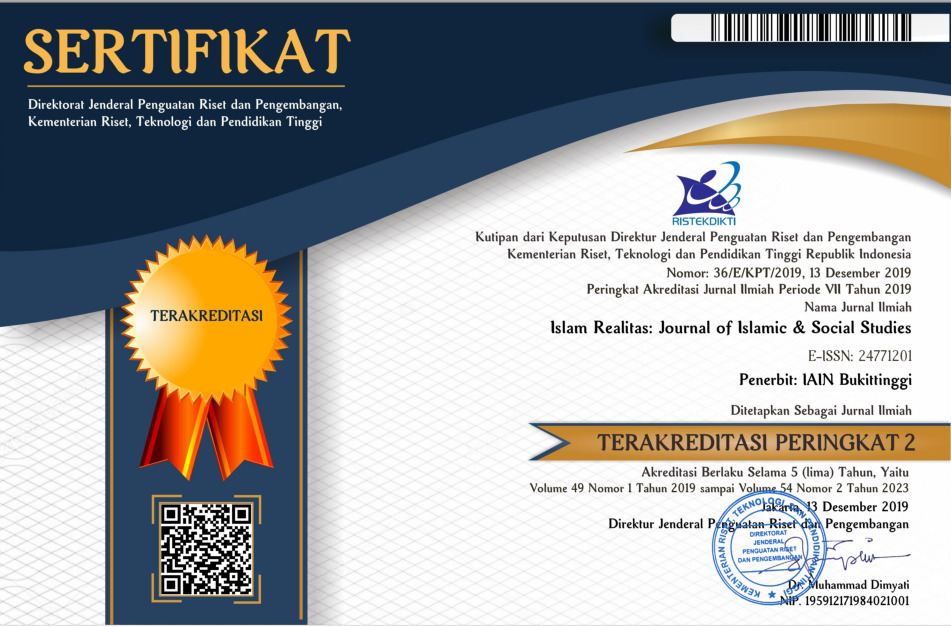The Impact of Colonialism on the Existence of Religions in Bukittinggi
DOI:
https://doi.org/10.30983/fuaduna.v5i1.4199Keywords:
Colonialism, History of Religion, BukittinggiAbstract
This article analyzes why religions other than Islam can enter and develop in Bukittinggi, a small city in the middle of the highlands of West Sumatra, primarily through the influence of colonialism. In Bukittinggi, at first, the Dutch colonial did not see Muslims as opponents. However, then the Dutch colonial political tendencies took a way to destroy any resistance from the local community by destroying the ulama and Muslims' forces and by developing non-Islamic religions as a rival. This article is using a historical approach. This article explores colonial penetration into Bukittinggi, how religious livelihood in Bukittingi before the colonialism, how people in Bukittinggi respond to a religion other than Islam, and how tolerance and religious harmony in Bukittinggi. The results showed that other than aiming for power, the Dutch colonial carried out the spread of Christianity, especially to association groups, as a means of strengthening power. Colonialist policies towards religions contradicted various principles, especially in education. They were starting from restrictions on religious teachers to the content of lessons, teaching permits, and the number of religious education institutions. The thick religion of Islam in Bukittinggi made it difficult for the Dutch colonialists to conquer Bukittinggi.
Artikel ini menganalisis alasan kenapa agama-agama selain Islam dapat masuk dan berkembang di Kota Bukittinggi, terutama melalui pengaruh kolonialisme. Pada konteks Kota Bukittinggi, pada awalnya kolonialis Belanda tidak melihat umat Islam sebagai lawan. Namun kemudian kecenderungan politik kolonialis Belanda menempuh cara menghancurkan setiap perlawanan masyarakat lokal dengan menghancurkan kekuatan-kekuatan ulama dan umat Islam, serta dengan mengembangkan agama non Islam sebagai tandingan. Dengan menggunakan pendekatan historis, artikel ini mengeksplor bagaimana proses masuknya kolonialisme ke Bukittinggi; bagaimana agama masyarakat Bukittinggi sebelum masuknya kolonialisme; bagaimana respon masyarakat Bukittinggi terhadap masuknya agama-agama selain Islam; serta bagaimana toleransi dan kerukunan umat beragama di Bukittinggi. Hasil penelitian menunjukkan bahwa di samping tujuan kekuasaan, kolonialis Belanda melakukan penyebaran agama Kristen, terutama kepada kelompok-kelompok asosiasi, sebagai alat mengokohkan kekuasaan. Kebijakan kolonialis terhadap agama-agama, justru bertolak belakang dengan beragam prinsip, khususnya dalam pendidikan. Mulai dari pembatasan guru agama hingga isi pelajaran, izin mengajar, dan jumlah lembaga pendidikan agama. Kentalnya agama Islam di Bukittinggi menjadikan kolonialis Belanda kesulitan dalam menaklukkan Bukittinggi.
References
Anggraini, Reni Dian. “Perlawanan Dan Pembebasan Kolonialisme Pada Tarekat Qadiriyah Wa Naqsyabandiyah (1888-1903).†Islam Transformatif: Journal of Islamic Studies 4, no. 2 (December 2020): 135. https://doi.org/10.30983/it.v4i2.3346.
Bakhtiar. Ranaah Minang Di Tengah Cengkeraman Kristenisasi. Jakarta: Bumi Aksara, 2005.
Bukittinggi, BPS Kota. “Bukittinggi Dalam Angka 2016.†Bukittinggi, 2016.
Dobbin, Christine. Gejolak Ekonomi, Kebangkitan Islam, Dan Gerakan Padri. Jakarta: Komunitas Bambu, 2008.
Fadila, Zikri. Penerbitan Minangkabau Masa Kolonial: Sejarah Penerbitan Buku Di Fort de Kock (Bukittinggi) 1901-1942. Gre Publishing, 2018.
Foucault, Michel. Power: The Essential Works of Michel Foucault 1954-1984: Essential Works of Michel Foucault 1954-1984. Administrative Science Quarterly. Vol. 3. London: Penguin Books Limited, 2002.
Graves, Elizabeth E. Asal Usul Elit Minangkabau Modren Respon Terhadap Kolonial Belanda Abad XIX/XX Terj. Novi Andri Dkk. Jakarta: Yayasan Obor Indonesia, 2007.
Hadler, Jeffrey. Sengketa Tiada Putus: Matriarkat, Reformisme Agama, Dan Kolonialisasi Di Minangkabau. Tingkap. Vol. 9. Jakarta: Freedom Institute, 2008.
Hakimy, Idrus. Rangkaian Mustika Adat Bersandi Syarak Di Minangkabau. 6th ed. Bandung: Pt. Remaja Rosdakarya, 2004.
Hamka. Antara Fakta Dan Khayal Tuanku Rao. Yogyakarta: Suara Muhammadiyah, 2008.
Hendri, Novi, and Hardi Putra Wirman. “The Radical Islamic Movements in West Sumatra: An Early Investigation and Mapping.†Islam Realitas: Journal of Islamic & Social Studies 6, no. 1 (2020): 100–118.
Mursal, Irhas Fansuri. “Surau Dan Sekolah: Dualisme Pendidikan Di Bukitinggi 1901-1942.†Titian: Jurnal Ilmu Humaniora 2, no. 1 (2018): 100–115.
Pijper, G.F. Beberapa Studi Tentang Sejarah Islam Di Indonesia 1900-1950. Jakarta: Universitas Indonesia, 1985.
Said, Edward W. Orientalism. New York: Pantheon Books, 1978.
Steenbrink, Karel A. Beberapa Aspek Tentang Islam Di Indonesia Abad Ke-19. Jakarta: Bulan Bintang, 1984.
Sumanti, Solihah Titin. “Analisis Kebijakan Pemerintah Kolonial Belanda Terhadap Pendidikan Islam.†Jurnal Ilmiah Sosialogi Agama (JISA) 1, no. 1 (July 2018): 44. https://doi.org/10.30829/jisa.v1i1.1791.
Suminto, H A. Politik Islam Hindia Belanda. Jakarta: Lembaga Penelitian Pendidikan dan Penerangan Ekonomi dan Sosial, 1985.
Suryanegara, Ahmad Mansur. Menemukan Sejarah: Wacana Pergerakan Islam Di Indonesia. 4th ed. Bandung: Mizan, 1998.
Taufik, Zulfan. “From Negative to Positive PeaceL Strengthening the Role of Youth in Religious Peacebuilding in Bukittinggi, West Sumatra.†AKADEMIKA: Jurnal Pemikiran Islam; Vol 25 No 2 (2020), October 4, 2020. https://e-journal.metrouniv.ac.id/index.php/akademika/article/view/2132.
Yulika, Febri. Epistemologi Minangkabau: Makna Pengetahuan Dalam Filsafat Adat Minangkabau. Yogyakarta: Gre Publishing, 2012.
Downloads
Published
How to Cite
Issue
Section
Citation Check
License
Authors who publish with this journal agree to the following terms:
- Authors retain copyright and grant the journal right of first publication with the work simultaneously licensed under a Creative Commons Attribution-ShareAlike 4.0. that allows others to share the work with an acknowledgment of the work's authorship and initial publication in this journal.
- Authors are able to enter into separate, additional contractual arrangements for the non-exclusive distribution of the journal's published version of the work (e.g., post it to an institutional repository or publish it in a book), with an acknowledgment of its initial publication in this journal.
- Authors are permitted and encouraged to post their work online (e.g., in institutional repositories or on their website) prior to and during the submission process, as it can lead to productive exchanges, as well as earlier and greater citation of published work (See The Effect of Open Access).





